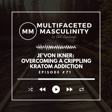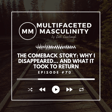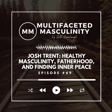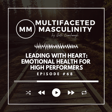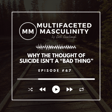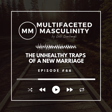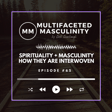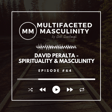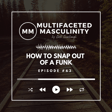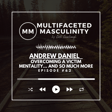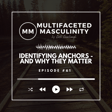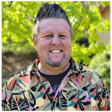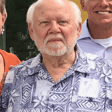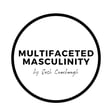
We‘re Back!... and With Some Exciting New Changes. - Part2 | Ep #43
In this episode, Josh and Seth lay the foundation for season two of Multifaceted Masculinity with a discussion surrounding the use of Psychedelic Plant Medicine. Their conversation leads from their own personal journeys and gives a new perspective to those who are not familiar with the use of Psychedelics to assist in mental health. As Mindset and Integration Coaches, they champion the necessity of Psychedelic use for their clients.
In this episode you'll learn:
- Why working with Psychedelics could save your life
- The history of Psychedelic Plant Medicines and the War on Drugs
- Psychedelics for assistance in approving Mental Health
- A journey of coming off of Antidepressants
- The Myths of Psychedelics and what Science is telling us is true
- What’s the Difference between Micro-dose and Macro-dose
“Psychedelics reverse some of the damage of depression, it’s opening up other pathways and literally expanding my mind, my consciousness, and helping me heal myself.” - Josh Cearbaugh
“One of the greatest reasons to ever use plant medicine is to increase your self-love, to fall back in love with ourselves, to have this level of self-love, so that we can begin to choose really good things for us in our life and the people around us see that.” - Seth Conner
LinksHost Name: Josh Cearbaugh
https://www.instagram.com/jcearbaugh/
https://facebook.com/joshcearbaugh
https://www.jumpstartyourlife.com
Host Name: Seth Conner
https://www.instagram.com/sethaconner/
https://www.facebook.com/iSethConner/
https://www.linkedin.com/in/sethaconner/
Companies, Products & Places Mentioned
Mushroom Doctor (psilocybin micro-dosing)
www.MushroomDoctor.co/shop
John Hopkins University (Depression/Smoking Cessation/Etc) (https://www.hopkinsmedicine.org/psychiatry/research/psychedelics-research.html)
People Mentioned
Timothy Leary (Wiki page) (https://en.wikipedia.org/wiki/Timothy_Leary)
Resources Mentioned
Default Mode Network (https://psychedelicstoday.com/2020/02/04/psychedelics-and-the-default-mode-network/)
